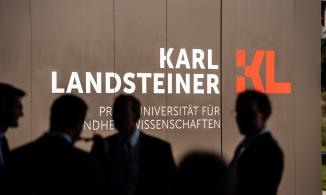
Quality management
Karl Landsteiner University of Health Sciences (KL) is committed to ensuring that quality is an integral part of all objectives and at all levels of the organisation.
The vision, values and goals of Karl Landsteiner University (KL) are formulated in its mission statement. KL uses this as a basis for the development of its university strategy and corresponding plans and measures for its implementation. KL fulfils its institutional responsibility for quality assurance and development in the fields of teaching and learning, research and organisation with the aid of a quality management system.
One important aspect of KL’s university strategy is the establishment of a culture of quality and a common understanding of quality among its staff members. Overall responsibility lies with the university management, which promotes a culture of quality at all levels of the organisation and continuously aligns its implementation strategies with the social goals and mission of the university.
The KL quality management system
KL’s quality management system encompasses the formulation of quality objectives and corresponding implementation measures in research and teaching, and supporting areas ( human resources management, finance, procurement, systems).
The Quality Management Unit assists the Rectorate in achieving its goals, specifically in the design, implementation and further development of the quality management system of KL, and assumes the following tasks:
- Coordination and monitoring of external quality assurance procedures in accordance with the Austrian Act on Quality Assurance in Higher Education (Hochschul-Qualitätssicherungsgesetz, HS-QSG)
- Planning, organisation and implementation of audits
- Design, implementation and continued development of an evaluation strategy
- Expansion and continuous refinement of process management
- Reporting (Lower Austria Intellectual Capital Report, Statistics Austria, AQ Austria)
The measures taken to ensure and improve quality are aimed at achieving continuous improvement in the quality of research and teaching, and in the supporting areas (personnel administration, finance, procurement, systems).
The individual organisational units and their managers are responsible for maintaining and improving their quality standards. The necessary framework conditions (such as guidelines) are defined by a central body and communicated transparently to everyone. The Quality Management Unit acts in an advisory and supportive capacity for all organisational units of KL in developing quality management tools and integrating them into the four-stage control loop of the continuous improvement process (PDCA cycle). All necessary coordination processes are carried out in a structured manner within the responsible bodies, on the basis of transparent processes and with suitable implementation tools.
- Creating a research environment for world-class research
- Science-based education for our students at the highest international level paired with practical relevance in small groups
- Ensuring top-quality services in research, studies and teaching, professional development and services
- Working in partnership with students on an equal footing (researchers, instructors, administration)
- Promoting national and international research and teaching networks and encouraging mobility among students and young researchers
- Selecting the best minds for KL (competitive appointment procedures, staff intake, student intake) and targeted promotion of new talent
- Scholarships and financial aid for funding studies
- Increased awareness of gender and diversity issues
- Targeted development and promotion of qualified academic staff at the university hospitals
- Continuous improvement of the quality of research and teaching through internal and external evaluations
- The KL Advisory Board advises the Rectorate on KL’s strategic orientation.
- Management attends top TOMs (team objective meetings) to develop annual goals for KL.
- Development of unique contributions (UCs) for each department and each individual employee
- Target agreement and development meetings held with all staff members
- Regular standardised monitoring of the quality of research and teaching through internal and external evaluations
- Course evaluations
- Module and semester evaluations
- Internship evaluation
- Evaluation of exams
- Faculty evaluation
- Research evaluation
- Employee survey
- Student survey
- Faculty survey
- Graduate survey
- Development of key performance indicator system (number of funded projects, number of peer-reviewed academic publications, drop-out rate, supervision ratios, average duration of studies)
- Continuous further development of the curricula and review of the current curricula in regular cycles;
adjustments to the curriculum (qualification profile & learning objectives, learning methods, examination methods, administrative regulations); each requires the approval of the Senate and is subject to external accreditation. - Human resources development (professional development opportunities, MME as a strategic qualification measure, (individual coaching, faculty portfolio, workshops) to improve faculty qualifications, skills and motivation)
- Transparent standardised selection procedures (competitive appointment procedures, staff intake, student admissions)
- Individualised, targeted support for students (mentoring programme)
- Career model for academic staff
- Awards and funding programmes for “good teaching”
- Preparation of guidelines and organisational manuals


